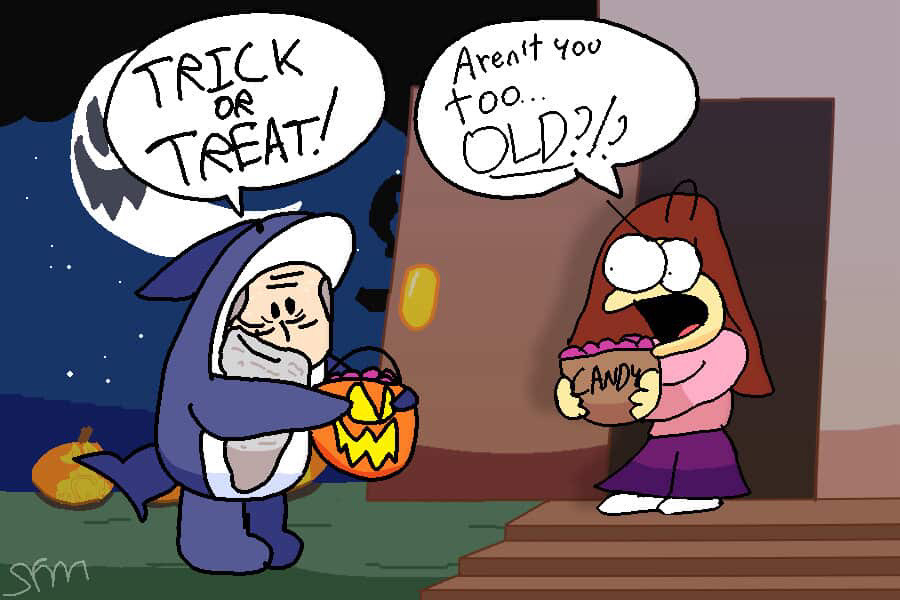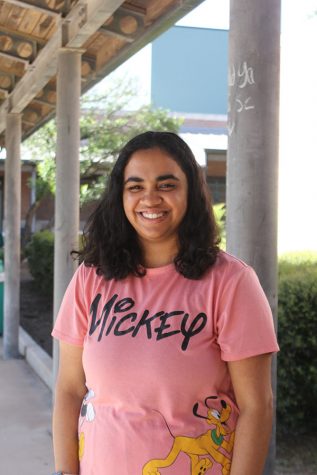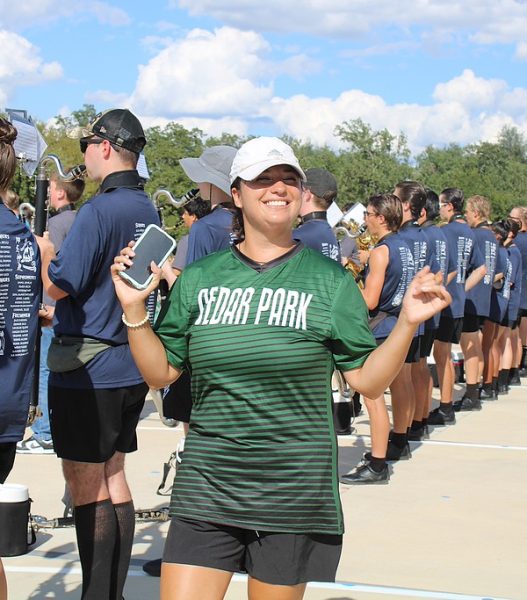It’s Just a Word
The Craze Behind the New Online Game ‘Wordle’
Senior Evy Grenger focuses as she manages to get the “Word of the Day.” Grenger has been playing “Wordle” since January, and said it has improved her critical thinking skills and loves to challenge herself with the new “Word of the Day.” “I feel like it has increased my critical thinking skills because to figure out the word, you really have to think about where the letters go and which are correct,” Grenger said. “It makes me think about the words I know and how they could possibly fit into the puzzle.”
March 4, 2022
One word, five letters. Guess it right, and victory is yours. But here’s the catch: six guesses, once a day. That’s all a typical player of the online game “Wordle” gets.
The game, which can be accessed through the New York Times, involves guessing one, five-letter word that earns players points once the word has been guessed successfully.
The game was introduced by Josh Wardle, a software engineer, who first created the game as a website for his girlfriend to play word games on. However, after New York Times bought the game for more than $1 million, the game’s popularity skyrocketed.
The game’s popularity began immediately after it was bought by the New York Times in January. However, it was actually released in October of 2021, and already had 90 users by then. It now has over 2 million users. Because the New York Times bought it, the game has now become a free and accessible platform for users.
“I think something popped up [on the New York Times],” English teacher Kristin Burke said. “The increasing popularity of it on New York Times, before New York Times bought ‘Wordle’, [was when I came across it]. And I was intrigued, so I just pulled it up, and tried it out, and I just got suckered in.”
The game first gained popularity amongst teachers, who then introduced it to their students. Burke said she is an avid player of the game who encourages students to participate as well.
“The reason I introduced [Wordle] to them is [because] we were in the middle of an argument unit,” Burke said. “On one of the days, we were doing stations on gaming and sports. So, [in] one of the stations, they had to play ‘Wordle’ and decide whether they enjoyed it or not, and make an argument about that. Many of them, who had never played before, were totally suckered in and got excited.”
For senior Evy Grenger, the appeal of “Wordle” is its simplicity and the limited amount of guesses she gets. This characteristic of the online game is what sets it apart from other games, according to Grenger.
“I found [Wordle] interesting because only being able to guess one word a day creates higher stakes,” Grenger said. “If you aren’t able to correctly guess the ‘Word of the Day’, you have to wait until the next day to try again. I feel like this makes ‘Wordle’ more exciting and interesting than other word games, since you don’t have unlimited guesses.”
The game also ensures a way for players to interact with each other over the game as well. Sharing individual progress also is a great way for players, such as senior Rowan Rodriguez, to keep track of their streaks and compete.
“I think that everyone got the same word, and that it only lasts for 24 hours,” Rodriguez said. “I enjoy this part of it because I get to compete with others, like my mom and my friends. I also just like to think, so it’s nice if I want to use my brain, but not learn something completely new, or do schoolwork.”
Players, such as Burke, have also compared the game to a crossword puzzle. The main appeal behind ‘Wordle’ is its challenge to a players’ knowledge of words and vocabulary, which they can expand on as they continue to play the game.
“I don’t usually play games,” Burke said. “[Wordle] is a lot, to me, like a crossword puzzle. So, that’s exciting to me. I also love words, because I’m an English teacher, so I’m always kind of intrigued [by] how many words I know, and I also like the fact that you can only play it once, so you can’t get suckered into being obsessed with it all day. You have to really take your time and think, and I enjoy that. It feels kind of like a little Zen moment for me when I’m playing it.”
In dawn of ‘Wordle’s’ popularity, the game has even extended to other variations as well. These other variations of the game use different aspects of popular culture and integrate it into the ‘Wordle’ rules. One of these variations is ‘Nerdle’, a ‘Wordle’ inspired game in which players are required to guess equations, numbers and operations.
“You get more columns than ‘Wordle’,” Physics teacher Alison Trueblood said. “It’s basically an equation where you have to guess whether the numbers are added or subtracted or divided or multiplied, and sometimes, there may be more than one of those [operations]. Then, you have to figure out where all the symbols go, so where the operators go, and then you have to figure out where the equal sign goes, and then you have digits zero through nine basically, and you have to figure out where they go. You get more tries. There’s eight columns, and you get at least seven tries to get the equation correct.”
According to Trueblood, “Nerdle” only appeals to a certain group of people. It’s rules and procedures, being nearly the same to “Wordle,” cause it to have a similar appeal to the original game itself, according to Trueblood.
“The appeal of Nerdle is more for people who like to add and subtract numbers, or do that kind of math in their heads,” Trueblood said. “It’s kind of the difference between ‘Sudoku’ and crossword puzzles. It’s a puzzle with numbers. If you like to manipulate, and basically use math as a language rather than a written language with letters, then “Nerdle” would be more for you.”
Critical thinking skills and brain power are tested with this game, according to Trueblood. Because ‘Wordle’ and the other games test critical thinking skills, they are renowned for the challenges they present to players.
“It’s good that people are using their brains to think critically,” Trueblood said. “I don’t know if you can measure it tangibly, but I do think that it helps keep your brain sharp. Rather than just staring at somebody else making a Tiktok video, you’re actually actively thinking about something that you could use. It keeps your brain sharp.”






![Senior Jett Mckinney stores all the clothes in his own room, with half of it stored in his closet along with his personal clothes, and the rest taking up space in his room.
“There’s been times [when] there’s so much clothing stored here and it gets overwhelming, so I end up having to sleep somewhere else in the house,” Mckinney said.](https://cphswolfpack.com/wp-content/uploads/2025/11/DSC_0951-1200x800.jpg)



![Broadcast, yearbook and newspaper combined for 66 Interscholastic League Press Conference awards this year. Yearbook won 43, newspaper won 14 and broadcast took home nine. “I think [the ILPC awards] are a great way to give the kids some acknowledgement for all of their hard work,” newspaper and yearbook adviser Paige Hert said. “They typically spend the year covering everyone else’s big moments, so it’s really cool for them to be celebrated so many times and in so many different ways.”](https://cphswolfpack.com/wp-content/uploads/2025/05/edited-ILPC.jpg)




![Looking down at his racket, junior Hasun Nguyen hits the green tennis ball. Hasun has played tennis since he was 9 years old, and he is on the varsity team. "I feel like it’s not really appreciated in America as much, but [tennis] is a really competitive and mentally challenging sport,” Nguyen said. “I’m really level-headed and can keep my cool during a match, and that helps me play a bit better under pressure.” Photo by Kyra Cox](https://cphswolfpack.com/wp-content/uploads/2025/09/hasun.jpg)

![Bringing her arm over her head and taking a quick breath, junior Lauren Lucas swims the final laps of the 500 freestyle at the regionals swimming competition on date. Lucas broke the school’s 18-year-old record for the 500 freestyle at regionals and again at state with a time of 4:58.63. “I’d had my eye on that 500 record since my freshman year, so I was really excited to see if I could get it at regionals or districts,” Lucas said. “ State is always a really fun experience and medaling for the first time was really great. It was a very very tight race, [so] I was a bit surprised [that I medaled]. [There were] a lot of fast girls at the meet in general, [and] it was like a dogfight back and forth, back and forth.” Photo by Kaydence Wilkinson](https://cphswolfpack.com/wp-content/uploads/2025/03/Kaydence-2.7-23-edit-2.jpg)


![As her hair blows in the wind, senior Brianna Grandow runs the varsity girls 5K at the cross country district meet last Thursday. Grandow finished fourth in the event and led the varsity girls to regionals with a third place placement as a team. “I’m very excited [to go to regionals],” Grandow said. “I’m excited to race in Corpus Christi, and we get to go to the beach, so that’s really awesome.” Photo by Addison Bruce](https://cphswolfpack.com/wp-content/uploads/2025/10/brianna.jpg)

















![Holding a microphone, baseball booster club president Chris Cuevas announces the beginning of the annual cornhole tournament. The event has been held for the past two years and is designed to raise money for the baseball program in a fun way. “We’re a baseball team, so people love to compete,” Cuevas said. “So we figured we better do something that gets [their] attention. They want to compete. It’s not a hard sport to do, and we have all different [skill] levels [of participants].” Photo by Henry Mueller](https://cphswolfpack.com/wp-content/uploads/2025/11/Henry-715-1200x900.jpg)


















